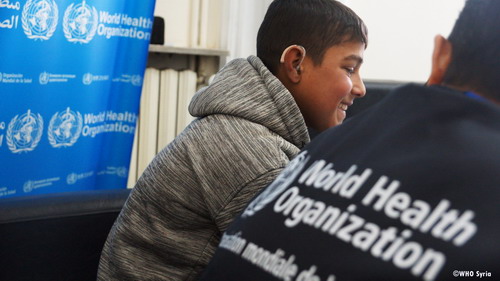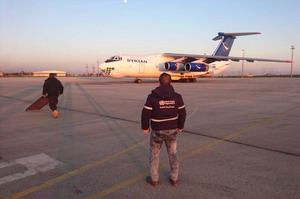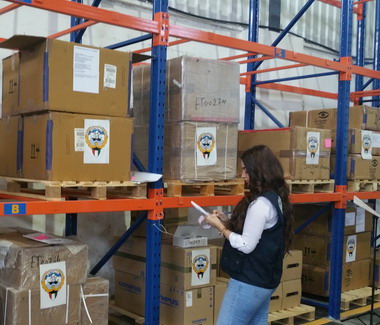WHO concerned over critical health situation in Al-Hol camp, Al-Hasakeh
31 January 2019, Damascus, Syria – The World Health Organization is extremely concerned about the deteriorating humanitarian situation in Al-Hol camp in Al-Hasakeh governorate, and calls on all parties to the conflict to provide unhindered humanitarian access to people in need of life-saving aid.
Over the last 2 months, approximately 23 000 people, mainly women and children fleeing hostilities in rural areas of neighbouring Deir-ez-Zor, have arrived in the camp. Many of them have walked or travelled in open trucks for several days and nights in the bitterly cold winter weather. Their journeys have been delayed en route by lengthy security screening procedures in an exposed field, and their ordeal has not ended on arrival to the camp. Thousands of new arrivals have been forced to spend several nights in the camp’s open-air reception and screening areas, without tents, blankets or heating. At least 29 children and newborns are reported to have died over the past 8 weeks, mainly from hypothermia, while travelling to the camp or shortly after arrival.
Restoring hearing to a Syrian boy
 Khaled after receiving the cochlear device. Photo: WHO Syria 2019
Khaled after receiving the cochlear device. Photo: WHO Syria 2019
30 January 2019, Damascus, Syrian Arab Republic – 14-year-old Khaled lives with his mother and 3 brothers in eastern Ghouta, Rural Damascus. His father died 5 years ago, leaving his family with very little. Following his father’s death, Khaled and his family lived through some of the darkest days of the conflict. The situation was even more distressing for Khaled, who suffers from congenital hearing loss. When his hearing aid broke 5 years ago, his mother could not afford the cost of a replacement. Khaled has lived in a world of silence ever since, unable to communicate with others and they unable to communicate with him.
“When Khaled’s hearing aid broke, his teacher didn’t know how to deal with him, so she asked him to sit at the back of the class,”, said his mother. “He was always sitting on his own, and one by one his schoolmates abandoned him. He felt lonely and isolated and eventually he refused to go back to school.”
Khaled’s mother grew increasingly desperate, and asked everyone she knew how she could get help for her son. One of her friends told her about Tamayoz Social Care Association, one of the many nongovernmental organizations (NGOs) in Syria supported by WHO that treat patients for free.
WHO airlifts medical supplies to meet increasing health needs in north-east Syria
 An airplane carrying WHO 28 tonnes of medical supplies landing at Al-Qamishli airport in Al-Hasakeh governorate in north-east Syria today. Photo: WHO/Syria 201923 January 2019 – Today, the World Health Organization (WHO) airlifted more than 28 tonnes of medical supplies, equipment and vaccines to Al-Hasakeh governorate to respond to growing health needs in north-east Syria. This is the second shipment the Organization has airlifted to Al-Hasakeh this month. A first shipment of 20 tonnes of medical supplies was airlifted to the governorate on 8 January 2019.
An airplane carrying WHO 28 tonnes of medical supplies landing at Al-Qamishli airport in Al-Hasakeh governorate in north-east Syria today. Photo: WHO/Syria 201923 January 2019 – Today, the World Health Organization (WHO) airlifted more than 28 tonnes of medical supplies, equipment and vaccines to Al-Hasakeh governorate to respond to growing health needs in north-east Syria. This is the second shipment the Organization has airlifted to Al-Hasakeh this month. A first shipment of 20 tonnes of medical supplies was airlifted to the governorate on 8 January 2019.
New donation from Kuwait allows WHO to reach more Syrians in need
 The Government of Kuwait has donated a total of more than US$ 46 million since the start of the conflict to help WHO respond to overwhelming health needs in Syria21 January, 2019, Damascus, Syria – The Government of Kuwait has contributed more than US$ 3.8 million to WHO’s emergency and humanitarian operations in Syria. WHO will use the contribution to procure essential medicines and medical equipment for hospitals and health facilities throughout the country, focusing on facilities that provide treatment to children suffering from cancer.
The Government of Kuwait has donated a total of more than US$ 46 million since the start of the conflict to help WHO respond to overwhelming health needs in Syria21 January, 2019, Damascus, Syria – The Government of Kuwait has contributed more than US$ 3.8 million to WHO’s emergency and humanitarian operations in Syria. WHO will use the contribution to procure essential medicines and medical equipment for hospitals and health facilities throughout the country, focusing on facilities that provide treatment to children suffering from cancer.
Many Syrian families with seriously ill children travel long distances to reach the Al-Bairouni hospital in Rural Damascus and the paediatric hospital in Damascus, currently the only 2 public hospitals that have specialized cancer care services. WHO will deliver medicines to support cancer services in both health facilities, allowing them to manage their increasing caseload of patients. This will provide new hope to many families who cannot afford the cost of cancer treatment.








